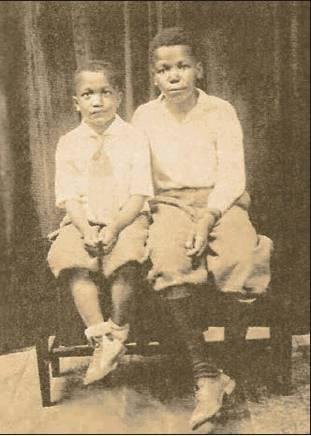A brother’s touching tribute
MARK POWELL’S
HOLY COW!
HISTORY
Ialways wanted a brother. Don’t get me wrong; I love both my sisters dearly and wouldn’t trade them for all the …
This item is available in full to subscribers.
Subscribe to continue reading. Already a subscriber? Sign in
Get 50% of all subscriptions for a limited time. Subscribe today.
Please log in to continueNeed an account?
|
A brother’s touching tribute
MARK POWELL’S HOLY COW! HISTORY
Ialways wanted a brother. Don’t get me wrong; I love both my sisters dearly and wouldn’t trade them for all the money wasted by Washington. Still, I missed out. Being a brother isn’t the same as having one.
Many years ago, a young man idolized his big brother. He took an unusual step to honor his sibling’s memory, too. A step that made him a household name. Here’s what happened.
John was born on the wrong side of the tracks in St. Louis in 1922, another poor black child in a poor black neighborhood. His dad tinkered with cars and electrical equipment, moved the family to Chicago, then vanished when John was four years old. He was raised by his mother, a half Seminole Indian, along with her parents.
There was also his big brother Fred, who loved baseball and was said to be the best first baseman in the Windy City. Fred was the father figure young John looked up to. In the little brother’s eyes, the sun rose and set around the bigger brother.
Life was hard in Depression-era Chicago. The boys’ mom did domestic work for an executive with the Chicago White Sox. But that wasn’t enough to get Fred a tryout with the team. No matter his connections, no matter his talent, the country just wasn’t ready for a black professional ball player in 1937.
With no skills off the diamond, Fred turned to crime. He was arrested and sent to prison for many years. Even there, he still won honors playing on prison teams.
John’s life took a different course. He grew up in the same tough neighborhood as future Chicago mayor Harold Washington. Nicknamed “Red” because of the reddish tint in his hair, he discovered a knack for making people laugh. He worked odd jobs in restaurants. There he met Malcolm Little, who went on to become Malcolm X and who called Red, “the funniest dishwasher in Chicago.”
He eventually started doing standup comedy. Though his material was raunchy, John’s star kept climbing. He stayed in touch with his brother Fred who, the last time they saw each other, asked him to always remember prisoners because they needed entertainment, too. Fred passed away soon afterward.
Red finally reached the big time in 1972 when NBC picked him to star in a groundbreaking black situation comedy. Red, who by then was performing under the name Redd Foxx, had one stipulation: his role, the show’s starring lead character, must have his late brother’s name. NBC agreed, even though it meant changing the show’s title.
Redd Foxx was born John Elroy Sanford. His older brother was Fred G. Sanford. And the show’s title became Sanford & Son. Fred’s middle initial became a running joke, too, with him giving a different explanation for it every time. He once told son Lamont, “I’m Fred G. Sanford, and the G stands for ‘Gonna give you five across your lip, you big dummy!’”
Redd also honored Fred’s legacy in another, more quiet way. He gave many free performances for inmates. He brought his standup act to tough federal and state prisons in Atlanta, Alcatraz, Sing Sing, and others.
When Redd Foxx suffered a heart attack in 1991 on the set of The Royal Family, his final sitcom, the cast and crew at first didn’t believe it. After all, staging phony heart attacks for attention (the “big one,” when he said he was going to join his late wife Elizabeth), had been another of the fictitious Fred G. Sanford’s trademark gags. But it was real, and it led to him joining the real Fred G. Sanford in the Great Hereafter. He was 68.
I’m not going to defend the filthy material in Redd Foxx’s comedy routines. Nor the millions of dollars in taxes he neglected to pay, either. Yet, there’s something touching about a man loving his brother so much he made sure that brother’s name became known to millions, and who honored his memory by bringing laughter to those who needed it most.
Brotherly love, indeed.
Congressman Joe Wilson has entered Mark Powell’s October 10 column on “The Man Who Saved Mankind” into The Congressional
Other items that may interest you










Comments
No comments on this item Please log in to comment by clicking here